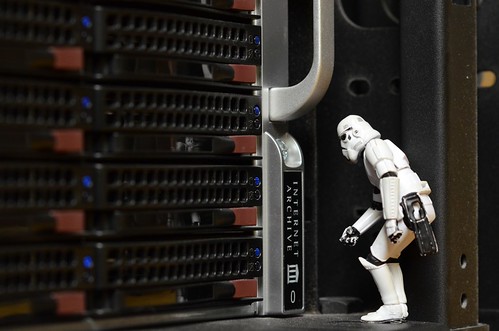Happy International Archives Day! June 8, 2013

http://www.flickr.com/photos/kalexanderson/6060432934/in/set-72157627289617985
Sunday June 9 is International Archives Day. Happy Archives Day everyone!
The Universal Declaration of Archives, adopted by UNESCO in 2011, says that :
‘Archives record decisions, actions and memories. Archives are a unique and irreplaceable heritage passed from one generation to another. Archives are managed from creation to preserve their value and meaning. They are authoritative sources of information underpinning accountable and transparent administrative actions. They play an essential role in the development of societies by safeguarding and contributing to individual and community memory. Open access to archives enriches our knowledge of human societies, promotes democracy, protects citizen’s rights and enhances the quality of life.’
The protection, management and accessibility of archives is therefore a core component of society.
Today we could be entering into a golden age of archives. We are living in an era of information abundance, unlike anything that has ever been seen before. Globally, the amount of digital data created, collected and shared in 2009 was 800,000 petabytes (.80 zettabytes). In 2011 it was 1.8 zettabytes. By 2020 it is anticipated this figure will be 35 zettabytes. One zettabyte is equivalent to the content of 260,000,000,000 DVDs. (Sydney Morning Herald, 8 July 2012)
International Data Centre research figures show that information volumes are increasing by 57% annually. Globally, people are creating more information than ever before about their lives and their work and the depth and variety of the data being created is extraordinary. In terms of management too, the capacities of systems to create, store and mine these extensive volumes of data are increasing in scale and sophistication every day.
We should therefore be entering into an era where we have the capacity to create archives and document and understand society in ways we never have before.
But creating and maintaining archives today is a complex problem. In today’s information-rich digital society, it is a real challenge to carry forward a stable archival record into the future.
There are many reasons for this. Many digital business systems which have replaced paper-based processes don’t natively make and keep records. Where these systems do make records, it can be hard to safeguard these records and sustain them through software and hardware changes.
In other scenarios, short term deadlines define many project requirements. Sometimes important records about clients, cases, projects, constructions or programs are not seen as necessary to keep after a project completion date and are routinely deleted.
In other scenarios, business units don’t think about how to repatriate data back into corporate systems from cloud environments, or organisations apply uniform data purge rules to both short and long term value information. Information that is of archival value is also abandoned to back up tapes, orphaned systems, legacy network drives, USB sticks or superseded databases where no one will ever be able to understand what its true value is.
In a 2010 survey of New Zealand government Chief Information Officers conducted by Archives New Zealand, the number one corporate information management risk identified was that contemporary organisations are not aware of the value of the information they hold.
In today’s society, one of our key risks is that we are not aware of the immediate and long term value of the archives our society is currently creating.
Records are being created today that will be the archival record our society relies on in the future. In twenty year’s time we will need today’s records to show where asbestos was used, where gas pipelines were laid, what government policies were in place, how hospitals were built, where roads were constructed, how clinical trials were conducted, how much rain fell, what sea levels were, how many kids were in government sponsored care etc etc.
Today’s records can also help tomorrow’s businesses to be smarter, more efficient and more strategic by using core information for clever reuse and analysis. But before they can serve any of these purposes in the future, we really need to protect and manage our archival records today.
Archives are really important. And today they really do need proactive identification, care and management from their creation to ensure they are going to be around for as long as our society needs to use them.
So let’s celebrate Archives Day on 9 June. Let’s treasure the amazing archival records we have and plan for the safeguarding and maintenance of our archival records into the future.
And stay tuned over the coming weeks for some exciting news from State Records’ digital archives team about the fantastic work they are doing to preserve and make today’s digital archives accessible now and for many, many years into the future.


Leave a Reply
You must be logged in to post a comment.